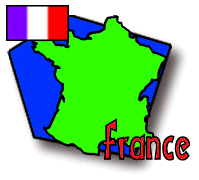Person of the Day: Florence Bouillon ![]()
Place of the Day: Maison Orangina - espace multimedia ![]()
- Maison Orangina
- 35 rue de la Paix
- 13001 Marseille
- FRANCE
- Tel +33 04.91.13.02.07
- Fax +33 04.91.13.02.08
- Email: maison@maison-orangina.org
- www.maison-orangina.org
- 35 rue de la Paix
Tech Fact of the Day: the island of Corsica is part of France
Group Dispatch, June 4

Questions? Ask Corinne ![]() !
!
Return to Fast Facts
 |
 |
 |
 |
 |
|
Itinerary/ Journal |
Discussions |
About France |
eDscape Projects |
Scrapbook |
|
|
|
|
|
|
|
Copyright 1997-2004 BikeAbout. All rights reserved.
